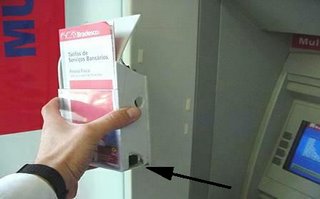buySAFE bonds sellers after verifying they are reputable and honest. They also contribute their time to protecting the average person in the sometimes murky waters of e-commerce. Recently, buySAFE has been taking on the (huge) issue of counterfeit merchandise.
Consumers are protected when they buy from a merchant bearing the buySAFE seal. Not a very bad deal for the consumer! Bonding isn't free, but many merchants experience higher sales volumes after being accepted by buySAFE. Trust can drive a lot of sales! buySAFE is also a viable means for a merchant to protect their assets.
The Association of Certified Fraud Examiners noted in their last report to the nation that
small businesses suffer "disproportionate fraud losses," when they are victimized by fraud. Large merchants can afford experts to deal with their fraud problems, however the cost is hiring experts can be restrictive for smaller merchants.
Of the numerous fraud issues found on auction sites, complaints about counterfeit goods rank pretty high. People buy items believing they are the "real deal," only to discover the item is a (knock-off) counterfeit.
Companies, who sell respected and trusted brands, are impacted by a loss of sales and consumer trust in their products, also. Some of them have already filed civil litigation against eBay because of the amount of knock-off (counterfeit) merchandise being sold on the site.
Even though auction sites offer seller rating systems, these ratings are often compromised when seller accounts are hijacked (taken over). eBay and PayPal (by most accounts) are recognized as the two most phished brands out there.
The intent of most of these
Phishing schemes is to obtain personal/financial information to steal money (and or) take over legitimate accounts.
This can also happen when
malware (
crimeware) is inserted into an unprotected system and personal/financial details are stolen, normally using
key logging software. Sadly enough, the criminal element has found it pretty easy to remain anonymous on auction sites, and few of them seem to get caught.
Whenever the Anti Phishing Working Group (
APWG) releases a new report, both of these activities seem to set a new record that surpasses the previous one.
Recently, eBay seems to be taking the fraud problem a lot more seriously, but someone using the name of "Vladuz" is intent on proving their systems are easily compromised. A good place to keep up on the Vladuz saga is
firemeg.com.
Although a good information source, I'm not certain that bashing Meg is the solution to fraud on auction sites.
Being the largest auction site, eBay is targeted by fraud all the time because of their popularity.
Fraud has already migrated to other auction sites, but they will always target the most popular.
The reason for this is simple (and it's only business for them) - there are more victims to harvest in popular places.
The term "Vlad" was based on a Romanian historical figure,
Vlad Tepes, who inspired the novel, Dracula. In recent times, the term has come to signify fraudsters from Romania, who are well established and organized in the world of auction fraud.
Besides, protecting merchants and consumers, buySAFE makes a lot of contributions to addressing fraud issues on auction sites. Most recently, Jeff Grass (buySAFE CEO) has posted a lot of educational information on his blog about the counterfeit problem,
here.
Jeff also appeared on the Today show, when they did a piece on counterfeit goods.You can view a clip of the show,
here.
And the Today show isn't the only place that considers buy Safe’s views on the counterfeit problem important.
The French government recently included buySAFE as part of a U.S. delegation (including government experts) to discuss the problem of counterfeit goods.The INTERNATION ANTICOUNTERFEITING COALITION (a non-profit) sums up the problem when they state:
Counterfeiting is big business.It is estimated that counterfeiting is a $600 billion a year problem. In fact, it's a problem that has grown over 10,000 percent in the past two decades, in part fueled by CONSUMER DEMAND.
The real truth is people who purchase counterfeit merchandise risk funding nefarious activities, contributing to unemployment, creating budget deficits and compromising the future of this country in the global economy.
IACC site,
here.
Part of the reason the activity has grown 10,000 percent is probably due to the explosion in e-commerce, especially on auction sites.
buySAFE seems to be doing a little more than just selling a product. In fact, they seem to be exercising some corporate responsibility by educating the public on fraud trends in the rapidly growing world of e-commerce.
Consumers can become a member of their Smart Buyer's Club, which leads you to a lot of good deals (safe to buy),
here. Club members accumulate points, which can be redeemed for goods, or services (listed on the site).
Anyone claiming to be a buySAFE merchant can be verified, which can be done on the site, also.
 Romanian fraudsters are known as Vlads. Vlad Tepes, a Romanian prince, was the inspiration for the original Dracula story. Interestingly enough, some Romanians consider him a a folk-hero, who drove away invading armies. Photo courtesy of Flickr.
Romanian fraudsters are known as Vlads. Vlad Tepes, a Romanian prince, was the inspiration for the original Dracula story. Interestingly enough, some Romanians consider him a a folk-hero, who drove away invading armies. Photo courtesy of Flickr.

